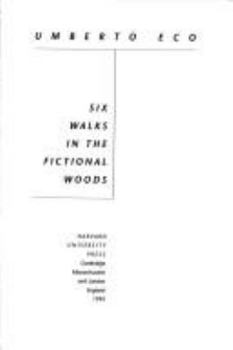Six Walks in the Fictional Woods
(Part of the The Charles Eliot Norton Lectures Series)
Select Format
Select Condition 
Book Overview
Umberto Eco explores the intricacies of fictional form and method. With a series of examples, ranging from fairy tales to Mickey Spillane, Eco draws his readers in by making them collaborators in the creation of text, and in the investigation of some of fiction's most basic mechanisms.
Format:Hardcover
Language:English
ISBN:0674810503
ISBN13:9780674810501
Release Date:January 1994
Publisher:Harvard University Press
Length:153 Pages
Weight:0.74 lbs.
Dimensions:0.7" x 5.8" x 8.6"
Customer Reviews
3 ratings
World as a forrest
Published by Thriftbooks.com User , 15 years ago
It is entirely possible, that you, who are reading these lines, are far more advanced in the field of narratology and semiotics. If that is the case, you won't find much material here, because I'm guessing that you already know what you're looking for. For others, few words should be said. Almost thirty years ago, when "Name of the rose" appeared for the first time in world markets, nobody could predict it's success. Complex story that read as a crime fiction, as a mere whodunit', but which held, in it's numerous layers, numerous worlds for competent reader to discover pushed it's author on the top of world's intellectuals. To distant observer, like myself, planetary success didn't seem to trouble Eco at all. He didn't comment on global politics, didn't meddle into affairs of state. All that he did was research and publishing of world of literature, aesthetics, beauty and lot's of other themes that may seem like a waist of time. And indeed, if Eco's impact, influence and success in scientific world should be measured with people who unlocked the human genome, one is tempted to say that his entire life was committed to futile things that interest few people borne and raised in Western tradition. Yet, that kind of reasoning would entirely wrong. Eco's thoughts on literature, interpretation and signs influenced many reader out there who suddenly found themselves into the forest-world. Where everything was clear before, now lay a jumble of codes that needed to be deciphered and adapted into some kind of functional system. Where plain story existed, now appeared infinite vectors of interpretation, and reader gradually learned that there isn't one, correct way to move trough the forest-world. Eventually, one learned to look upon the world with different set of eyes. This book here was written in late stages of Eco's thought, and it tends to show this what I'm talking about. It explains the "Name of the rose". Not the way that it should be read. Rather, it explains the idea behind it, it shows how, and why it was put together. And, if you until now understood literature as a mere fiction, something to pass time with, it'll open your eyes. Now, there are hundreds of books, in every language, on literary theory and much of them are dry pieces of work written for advanced reader who dedicated much of his life to this kind of research. This book isn't like that. On every page, you can almost feel Eco's enthusiasm with literature, his joy of reading. Maybe most important thing is that he doesn't put himself on an elevated position, preaching to the masses from it. He, like Socrates, takes his reader into a dialogue, with a single goal in mind - to discover undiscovered possibilities of fiction, to better understand the way every text (not just a literary one) is constructed, hoping in the end, to broad both minds that are set upon this trip. It seems to me that that is the way to write about literature, and I can but say that reading of this book w
more accessible than expected
Published by Thriftbooks.com User , 23 years ago
Six Walks is more accessible than I had expected (my copy is now heavily highlighted, marked up, and loaded with the little plastic stickies I use to flag ideas and references). Eco is speaking to readers and, thereby, equally to writers. The six Charles Elliot Norton lectures begin with the role time plays in fiction and end with the importance (to our perception of reality) of accuracy in writing fiction. This is weighty stuff made accessible by Eco's illustration by example: Yes, Dante, Shakespeare, and Kafka, but the writers who give us Hercule Poirot, Agent 007 and Little Red Riding Hood as well. If you read fiction or write fiction, the material will be useful and the book will please.
Six Walks: A Sojourn in Eco's Fancy
Published by Thriftbooks.com User , 27 years ago
Eco's "Six Walks in the Fictional Woods" smells like Italo Calvino's "Six Memos for the Next Millenium". Each essay, or walk, is an extended musing, in an informally scholastic tone of voice, of the author's preferred elements of fiction reading and composition. Most of the comparative material is taken from Nerval's, Joyce's and his own works, and given splashes of splendour with the special touch of brilliance to which we all know Eco has easy access. The essays lack the intensified beauty of his fiction ("Foucault's Pendulum," or "The Name of the Rose"), but demand consideration standing out as interesting thought material from the legendary linguist. --Alejandro Arevalo






